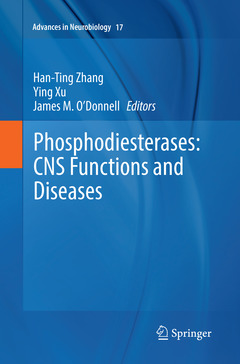Phosphodiesterases: CNS Functions and Diseases, Softcover reprint of the original 1st ed. 2017 Advances in Neurobiology Series, Vol. 17

Part I. PDEs and Signaling, Circuitry, and Implications of CNS Functions and Disorders.- 1. Phosphodiesterase Diversity and Signal Processing within cAMP Signaling Networks.- 2. Current Understanding of PDE10A in the Modulation of Basal Ganglia Circuitry.- 3. Interaction of Cdk5 and cAMP/PKA Signaling in the Mediation of Neuropsychiatric and Neurodegenerative Diseases.- 4. The PDE4 cAMP-specific Phosphodiesterases: Targets for Drugs with Antidepressant and Memory-enhancing Action.- 5. Phosphodiesterase-4B as a Therapeutic Target for Cognitive Impairment and Obesity-related Metabolic Diseases.- Part II. PDEs in Cognition of Aging and Alzheimer’s Disease.- 6. From age-related Cognitive Decline to Alzheimer’s Disease: A Translational Overview of the Potential role for Phosphodiesterases.- 7. The Past, Present, and Future of Phosphodiesterase-4 Modulation for age-induced Memory Loss.- 8. A Role for Phosphodiesterase 11A (PDE11A) in the Formation of Social Memories and the Stabilization of Mood.- 9. Role of PDE9 in Cognition.- Part III. PDEs in Parkinson’s and Huntington’s Diseases.- 10. Regulation of Striatal Neuron Activity by Cyclic Nucleotide Signaling and Phosphodiesterase Inhibition: Implications for the Treatment of Parkinson’s Disease.- 11. Role of Phosphodiesterases in Huntington's Disease.- Part IV. PDEs and Psychiatric Disorders.- 12. The role of Phosphodiesterase-2 in Psychiatric and Neurodegenerative Disorders.- 13. Phosphodiesterase 1: A Unique Drug Target for Degenerative Diseases and Cognitive Dysfunction.- 14. PDE Inhibitors for the Treatment of Schizophrenia.- Part V. PDEs and Others.- 15. Targeting Phosphodiesterases in Pharmacotherapy for Substance Dependence.- 16. Genetic Understanding of Stroke Treatment: Potential role for Phosphodiesterase Inhibitors.- 17. A unique sub-pocket for Improvement of Selectivity of Phosphodiesterase Inhibitors in CNS.
Dr. Zhang’s major research interests focus on intracellular signaling in the mediation of neurodegenerative and psychiatric disorders. More specifically, he is interested in exploring the roles of phosphodiesterase (PDE)-mediated cyclic nucleotide (cAMP, cGMP) signaling in depression, anxiety, alcohol dependence, drug abuse, and cognition deficits associated with neurodegenerative disorders such as Alzheimer disease. Development of novel drugs for treating these disorders is also one of his research foci.
Dr. Zhang has published nearly 80 research papers and review articles and 18 book chapters, most of which focusing on PDEs, in particular the PDE4 enzyme family. He has been awarded the NARSAD Young Investigator Award twice (2006 and 2008). Dr. Zhang has been served as the Guest Chief Editor of Current Pharmaceutical Design and currently serves as the Deputy Chief Editor/Associate Editor for Metabolic Brain Disease, Frontiers in Pharmacology, Frontiers in Aging Neuroscience, Translational Neuroscience Review, Austin Psychiatry, and Editorial Board member for Scientific Reports and several other international jouDate de parution : 08-2018
Ouvrage de 471 p.
15.5x23.5 cm
Date de parution : 10-2017
Ouvrage de 471 p.
15.5x23.5 cm
